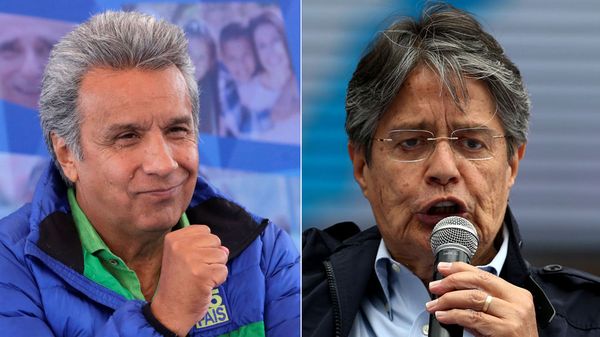Will Washington intervene in Ecuador’s election?
- By Earl Bousquet
 0 Comment(s)
0 Comment(s) Print
Print E-mail China.org.cn, March 26, 2017
E-mail China.org.cn, March 26, 2017
|
|
|
Presidential candidates Lenin Moreno (L) and Guillermo Lasso (R). [Photo/Xinhua] |
Red lights are flashing warning signals across Ecuador, where millions in the small South American nation are preparing to return to the polls on April 2, after casting ballots on February 19 in the first of two presidential polls to choose who will replace outgoing President Rafael Correa.
The upcoming poll will determine the fate of the Correa-led 10-year-old “Citizens Revolution,” which cut poverty in half under a system of “21st Century Socialism,” which created what the Overseas Development Institute (ODI) judged as “the world’s most inclusive period of economic growth.”
Located between Peru and Colombia and with ownership of the Galapagos Islands 1,000 miles away in the Pacific, the 272,045 square kilometer country of over 15 million people has seen much social progress under Correa, who from 2007 restored peace and stability, social and economic progress, to a nation that earlier counted seven presidents in ten years.
Correa’s two successive administrations put political reform alongside economic nationalism. He moved swiftly to overhaul the constitution and the discredited political institutions and renegotiated agreements with the mainly American private oil companies to increase the country’s share of its oil revenue.
But as with all left, progressive or liberal governments south of its border, the U.S. has been quite displeased -- over the past decade -- with Correa’s absolute refusal to cooperate with or pursue its South American policies or dictates.
Lenin Moreno, Correa’s successor to lead the ruling Allianza Pais party, won the majority of the votes in the first round. But he didn’t get the 40 percent needed – plus a 10 percent margin over his closest rival to win outright.
Ecuadoreans now have to choose between either continuing the progressive, political, social and economic policies Correa led, or changing to the fiscally conservative and right-wing policies of a pro-U.S. financial oligarch who already promises to reverse social gains and cut social spending.
The two leading candidates for the April 2 poll each represent an opposite side of Ecuador’s clear-cut left-right political spectrum.
The leading candidate, Vice President Lenin Moreno, is a co-leader of the Citizens Revolution.
He has published ten books (on issues ranging from philosophy to humor) and had active ties with the grassroots "forajido" movement in Quito, which helped organize the popular uprising that toppled President Alfredo Palacio in 2005.
One of several 2006 diplomatic notes from the U.S. Embassy in Ecuador – originally leaked by Wikileaks and re-released ahead of the February 2017 poll – noted Moreno's "genuine commitment to making a positive difference" in Ecuador.
The memo also said that the then newly-elected Vice President Moreno "conveyed a sincere desire to improve coordination of social programs" and he had "a mature, serene demeanor and a genuine commitment to making a positive difference for his country."
It also said he "spoke with passion about the need to attend better to the country's most disadvantaged populations" and "underscored the importance of the fight against corruption."
The leading right wing candidate, former banker Guillermo Lasso, was revealed in the same leaked cables as a regular visitor to and political consultant for U.S. officials in Ecuador. But he was also one of the most powerful figures in Ecuador's finance sector.
A former head of Coca-Cola's Ecuador operations, Lasso was also a president of the Bank of Guayaquil.
In 1998, he was appointed Governor of Guayas province by President Jamil Mahuad, and as one of his biggest election campaign financiers, Mahuad appointed him Ecuador’s Minister of Finance and Energy in 1999.
In 2000, the U.S. dollar replaced the Sucre as the national currency. But soon after, Lasso tactically resigned as finance minister just months before Mahuad fled the country, after being ousted by an uprising led by the country’s indigenous people.
The uprising had been inspired by a massive banking and dollarization scandal under Lasso’s watch that crippled the country's economy and led to the forced migration of almost three million Ecuadoreans.
Much is at stake ahead of the final ballot.
The past decade saw a repatriation of fiscal sovereignty to Ecuador through a taming of the influence of the International Monetary Fund (IMF), the U.S. lost a strategic military base it had in Ecuador and U.S. multinationals lost much of their absolute control of the nation’s vast oil resources.
Correa also rejected U.S. demands to deliver Wikileaks founder Julian Assange, who was granted political asylum five years ago at the Ecuador Embassy in London.
Washington remains very keen on Assange, and Lasso has already promised to expel him from the embassy within 30 days, if he wins the vote. However, the U.S. is also quite interested in regime change in Quito – and for bigger strategic geopolitical, economic and security reasons.
Emboldened by the constitutional coup that deposed leftist Brazilian President Dilma Rousseff, strengthened by the right-wing replacement of successive left-leaning governments in Argentina and supporting the increasingly aggressive agitation by the Venezuelan opposition of late, Washington smells blood in Ecuador.
Across South America, the expectation today is that the U.S. may use the period leading to the final ballot to try to reverse Moreno’s lead.
The President elected on April 2 will be sworn-in on May 24.
The warning signals are therefore flashing across Ecuador, urging urgent protection against external efforts to reverse the current clear course towards continuity of the Correa legacy with Moreno leading the Allianza Pais and taking the Citizens’ Revolution to its next stage.
Earl Bousquet is a contributor to china.org.cn, editor-at-large of The Diplomatic Courier and author of an online regional newspaper column entitled Chronicles of a Chronic Caribbean Chronicler.
Opinion articles reflect the views of their authors, not necessarily those of China.org.cn.







Go to Forum >>0 Comment(s)